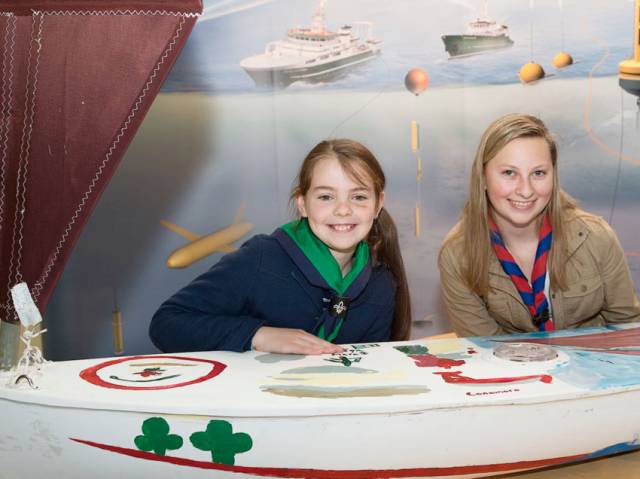#Lancer - An American high school student this week made the trip across the Atlantic to meet the Galway schoolgirl who found her marine science project mini-yacht last year.
Kaitlyn Dow from Waterford High School in Connecticut met eight-year-old Méabh Ní Ghionnáin for the first time at the Marine Institute in Galway for the official handover of the unmanned Lancer sailboat, which is set to be relaunched from the RV Celtic Explorer in the Atlantic later this year.
The 1.5m boat provided by Educational Passages was used as part of Kaitlyn's year-long research project studying wind and currents in the ocean.
Fitted with a GPS transmitter, the boat was released in May 2016 by NOAA ship Neil Armstrong off the coast of Cape Cod and successfully crossed the Atlantic.
In September, Kaitlyn made an appeal to Afloat.ie readers to keep a look-out for Lancer as it was tracked as far as Galway Bay.
And when it was eventually washed up in Connemara on 20 September, Méabh was the first to find it after following its GSP signal to a spot near her home in Lettermore.
Marine Institute chief executive Dr Peter Heffernan congratulated Méabh and Kaitlyn on their endeavours, adding: "We are thrilled to be involved with the continued voyage of the Lancer sailboat where it will be launched from the research vessel RV Celtic Explorer during its up and coming transatlantic expedition in April.
"This story is a wonderful example of both science literacy and citizen engagement with the oceans – themes which are a priority for the Atlantic Ocean Research Alliance between Canada, the EU and USA.
“Seeing new friendships formed across the Atlantic at an early age highlights the value of international partnerships that are essential for sharing marine science.”
Dr Heffernan added: “With the Atlantic being the second largest ocean in the world, it is important to increase our awareness of the value, opportunities and societal benefits the ocean provides us.”
Michael O'Connor, Kaitlyn's science teacher from Waterford High School, also made the trip to Ireland wit her and her family.
"I am thrilled to see this project to the next stage bringing Méabh and Kaitlyn together,” he said. “Although this started as a science project, the social connections and the sea that binds them are just as important as the data collected.
"Kaitlyn learned to design a study from the ground up, figure out how to fund it, make the social and professional connections to further the project and foster an international dialog about the ocean.
“She has a love for sailing and turned that love into a science project with great social impact and a great story. She will carry that combined social service and love of the sea to the Coast Guard Academy next year for college.”
Lancer was repaired by Ciaran Oliver and James Rattigan from Port of Galway Sea Scouts, as previously reported on Afloat.ie.
The Sea Scouts recently visited the RV Celtic Explorer with Méabh and will also be attending a seashore safari with Galway Atlantaquaria and the Explorers Education Programme team later this month.
































































